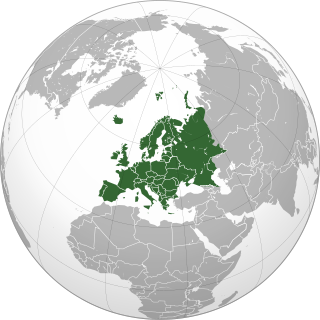
Europe is a continent located entirely in the Northern Hemisphere and mostly in the Eastern Hemisphere. It is bordered by the Arctic Ocean to the north, the Atlantic Ocean to the west, the Mediterranean Sea to the south, and Asia to the east. Europe shares the landmass of Eurasia with Asia, and of Afro-Eurasia with both Asia and Africa. Europe is commonly considered to be separated from Asia by the watershed of the Ural Mountains, the Ural River, the Caspian Sea, the Greater Caucasus, the Black Sea, and the waterway of the Bosporus Strait.

The euro is the official currency of 20 of the 27 member states of the European Union. This group of states is officially known as the euro area or, more commonly, the eurozone. The euro is divided into 100 euro cents.
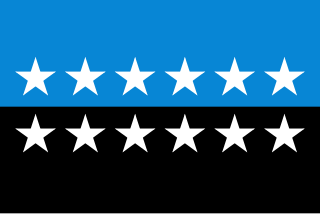
The European Coal and Steel Community (ECSC) was a European organization created after World War II to integrate Europe's coal and steel industries into a single common market based on the principle of supranationalism which would be governed by the creation of a High Authority which would be made up of appointed representatives from the member states who would not represent their national interest, but would take and make decisions in the general interests of the Community as a whole. It was formally established in 1951 by the Treaty of Paris, signed by Belgium, France, Italy, Luxembourg, the Netherlands, and West Germany and was generally seen as the very first step in the process of European integration following the end of the Second World War in Europe. The organization's subsequent enlargement of both members and duties ultimately led to the creation of the European Union.

The Industrial Revolution, sometimes divided into the First Industrial Revolution and Second Industrial Revolution, was a period of global transition of the human economy towards more widespread, efficient and stable manufacturing processes that succeeded the Agricultural Revolution. Beginning in Great Britain, the Industrial Revolution spread to continental Europe and the United States, during the period from around 1760 to about 1820–1840. This transition included going from hand production methods to machines; new chemical manufacturing and iron production processes; the increasing use of water power and steam power; the development of machine tools; and the rise of the mechanized factory system. Output greatly increased, and the result was an unprecedented rise in population and the rate of population growth. The textile industry was the first to use modern production methods, and textiles became the dominant industry in terms of employment, value of output, and capital invested.
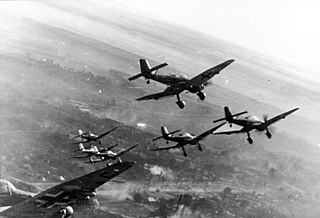
World War II or the Second World War was a global conflict that lasted from 1939 to 1945. The vast majority of the world's countries, including all the great powers, fought as part of two opposing military alliances: the Allies and the Axis. Many participating countries invested all available economic, industrial, and scientific capabilities into this total war, blurring the distinction between civilian and military resources. Aircraft played a major role, enabling the strategic bombing of population centres and delivery of the only two nuclear weapons ever used in war. It was by far the deadliest conflict in history, resulting in 70–85 million fatalities. Millions died due to genocides, including the Holocaust, as well as starvation, massacres, and disease. In the wake of Axis defeat, Germany, Austria, and Japan were occupied, and war crime tribunals were conducted against German and Japanese leaders.

The Cure are an English rock band formed in 1978 in Crawley, West Sussex. Throughout numerous lineup changes since the band's formation, guitarist, lead vocalist, and songwriter Robert Smith has remained the only constant member, though bassist Simon Gallup has been present for all but about three years of the band's history. Their debut album, Three Imaginary Boys (1979), along with several early singles, placed the band at the forefront of the emerging post-punk and new wave movements that had sprung up in the United Kingdom. Beginning with their second album, Seventeen Seconds (1980), the band adopted a new, increasingly dark and tormented style, which, together with Smith's stage look, had a strong influence on the emerging genre of gothic rock as well as the subculture that eventually formed around the genre.

Napoleon Bonaparte, later known by his regnal name Napoleon I, was a French emperor and military commander who rose to prominence during the French Revolution and led successful campaigns during the Revolutionary Wars. He was the leader of the French Republic as First Consul from 1799 to 1804, then of the French Empire as Emperor of the French from 1804 until 1814, and briefly again in 1815. His political and cultural legacy endures as a celebrated and controversial leader. He initiated many enduring reforms, but has been criticized for his authoritarian rule. He is considered one of the greatest military commanders in history and his wars and campaigns are still studied at military schools worldwide. However, historians still debate the degree to which he was responsible for the Napoleonic Wars, in which between three and six million people died.

International relations (IR) are the interactions among sovereign states. The scientific study of those interactions is also referred to as international studies, international politics, or international affairs. In a broader sense, the study of IR, in addition to multilateral relations, concerns all activities among states—such as war, diplomacy, trade, and foreign policy—as well as relations with and among other international actors, such as intergovernmental organizations (IGOs), international nongovernmental organizations (INGOs), international legal bodies, and multinational corporations (MNCs). There are several schools of thought within IR, of which the most prominent are realism, liberalism, constructivism, and rationalism.

A businessperson is an individual who has founded, owns, or holds shares in a private-sector company. A businessperson undertakes activities to generate cash flow, sales, and revenue by using a combination of human, financial, intellectual, and physical capital to fuel economic development and growth.

Jean-Baptiste Nicolas Robert Schuman was a Luxembourg-born French statesman. Schuman was a Christian democratic political thinker and activist. Twice Prime Minister of France, a reformist Minister of Finance and a Foreign Minister, he was instrumental in building postwar European and trans-Atlantic institutions and was one of the founders of the European Communities, the Council of Europe and NATO. The 1964–1965 academic year at the College of Europe was named in his honour. In 2021, Schuman was declared venerable by Pope Francis in recognition of his acting on Christian principles.

The Barbary pirates, Barbary corsairs, or Ottoman corsairs were mainly Muslim pirates and privateers who operated from the Barbary states. This area was known in Europe as the Barbary Coast, in reference to the Berbers. Slaves in Barbary could be of many ethnicities, and of many different religions, such as Christian, Jewish, or Muslim. Their predation extended throughout the Mediterranean, south along West Africa's Atlantic seaboard and into the North Atlantic as far north as Iceland, but they primarily operated in the western Mediterranean. In addition to seizing merchant ships, they engaged in razzias, raids on European coastal towns and villages, mainly in Italy, France, Spain, and Portugal, but also in the British Isles, the Netherlands, and Iceland.
A supranational union is a type of international organization that is empowered to directly exercise some of the powers and functions otherwise reserved to states. A supranational organization involves a greater transfer of or limitation of state sovereignty than other kinds of international organizations.

The Academia Europaea is a pan-European Academy of Humanities, Letters, Law, and Sciences. The Academia was founded in 1988 as a functioning Europe-wide Academy that encompasses all fields of scholarly inquiry. It acts as co-ordinator of European interests in national research agencies.
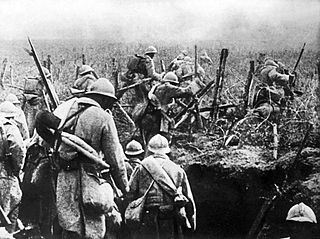
World War I, commonly known as The Great War or as the First World War was a global conflict between two coalitions: the Allies and the Central Powers. Fighting took place throughout Europe, the Middle East, Africa, the Pacific, and parts of Asia. One of the deadliest wars in history, it resulted in an estimated 9 million soldiers dead and 23 million wounded, plus up to 8 million civilian deaths from numerous causes including genocide. The movement of large numbers of troops and civilians during the war was a major factor in spreading the 1918 Spanish flu pandemic.

Robert Lewandowski is a Polish professional footballer who plays as a striker for La Liga club Barcelona and captains the Poland national team. He is regarded as one of the best players of his generation and as one of the best strikers of all time, as well as one of the most successful players in Bundesliga and Bayern Munich history. He has scored over 600 senior career goals for club and country.

Ameroseius is a genus of mites in the family Ameroseiidae. There are more than 60 described species in Ameroseius.
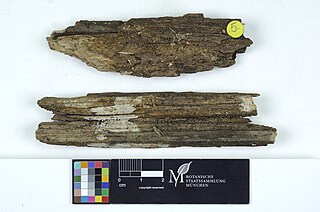
Colacogloea is a genus of fungi belonging to the class Microbotryomycetes. Most species in the genus are known only from their yeast states. Where known, basidiocarps have auricularioid basidia and occur as parasites on or in the fruit bodies of other fungi.

The Platygloeales are an order of fungi in the class Pucciniomycetes. Species in the order have auricularioid basidia and are typically plant parasites on mosses, ferns, and angiosperms, though Platygloea species appear to be saprotrophic.
Platygloea is a genus of fungi belonging to the class Pucciniomycetes. Basidiocarps of the type species are disc-shaped, gelatinous, and occur on dead wood, probably as a saprotroph. Microscopically, all species of Platygloea sensu lato have auricularioid basidia. Currently the genus contains a heterogeneous mix of auricularioid fungi not yet accommodated in other genera.
Tremella versicolor is a species of fungus in the family Tremellaceae. It produces small, pustular, gelatinous basidiocarps and is parasitic on the basidiocarps of Peniophora species, a genus of corticioid fungi, on dead attached or recently fallen branches. It was originally described from England.

















